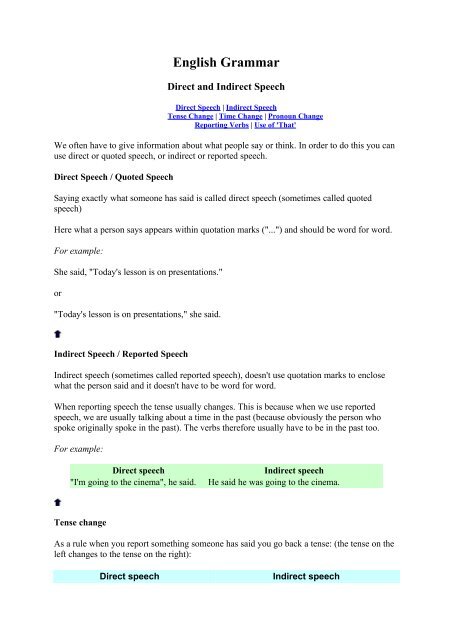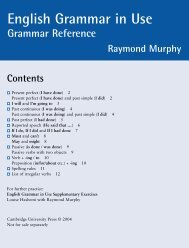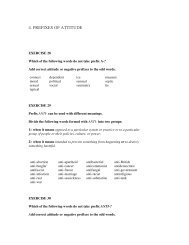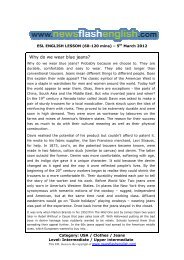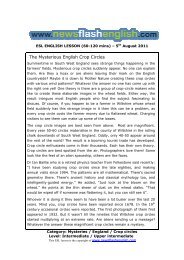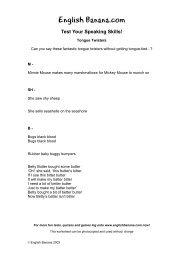Direct and Indirect Speech - ESL Teachers Board
Direct and Indirect Speech - ESL Teachers Board
Direct and Indirect Speech - ESL Teachers Board
- No tags were found...
Create successful ePaper yourself
Turn your PDF publications into a flip-book with our unique Google optimized e-Paper software.
He said, “I may go to school every day.”mightHe said, “I might go to school everyday.”mustHe said, “I must go to school every day.”have toHe said, “I have to go to school everyday.”shouldHe said, “I should go to school everyday.”ought toHe said, “I ought to go to school everyday.”He said (that) he might go to school every day.⇒ had toHe said (that) he had to go to school everyday.⇒ shouldHe said (that) he should go to school everyday.⇒ ought toHe said (that) he ought to go to school everyday.While not all of the possibilities have been listed here, there are enough to provide examples of the main rulesgoverning the use of indirect or reported speech. For other situations, try to extrapolate from the exampleshere, or better still, refer to a good grammar text or reference book.Some other verbs that can be used to introduce direct speech are: ask, report, tell, announce, suggest, <strong>and</strong>inquire. They are not used interchangeably; check a grammar or usage book for further information.<strong>Direct</strong> <strong>and</strong> indirect
<strong>Indirect</strong> <strong>Speech</strong> (also referred to as 'reported speech') refers to a sentence reporting whatsomeone has said. It is almost always used in spoken English.• If the reporting verb (i.e. said) is in the past, the reported clause will be in a past form.This form is usually one step back into the past from the original.For example:o He said the test was difficult.o She said she watched TV every day.o Jack said he came to school every day.• If simple present, present perfect or the future is used in the reporting verb (i.e. says)the tense is retained.For example:o He says the test is difficult.o She has said that she watches TV every day.o Jack will say that he comes to school every day.• If reporting a general truth the present tense will be retained.For example:The teacher said that phrasal verbs are very important.Changing Pronouns <strong>and</strong> Time SignifiersWhen changing from direct speech to indirect speech, it is often necessary to change thepronouns to match the subject of the sentence.For example:• She said, "I want to bring my children." BECOMES She said she wanted to bring herchildren.• Jack said, "My wife went with me to the show." BECOMES Jack said his wife hadgone with him to the show.It is also important to change time words (signifiers) when referring to present, past or futuretime to match the moment of speaking.For example:• She said, "I want to bring my children tomorrow." BECOMES She said she wanted tobring her children the next day.• Jack said, "My wife went with me to the show yesterday." BECOMES Jack said hiswife had gone with him to the show the day before.<strong>Indirect</strong> QuestionsWhen reporting questions, it is especially important to pay attention to sentence order. Whenreporting yes/ no questions connect the reported question using 'if'. When reporting questionsusing question words (why, where, when, etc.) use the question word.
For example:• She asked, "Do you want to come with me?" BECOMES She asked me if I wanted tocome with her.• Dave asked, "Where did you go last weekend?" BECOMES Dave asked me where Ihad gone the previous weekend.• He asked, "Why are you studying English?" BECOMES She asked me why I wasstudying English.The following chart includes sentences changed from quoted speech to reported speech usinga past form. NoteSimple past, present perfect, <strong>and</strong> past perfect allchange to past perfect in thereported form.Check your underst<strong>and</strong>ing with this reported speech quiz:Reported <strong>Speech</strong> Transformations QuizAdvanced Reporting VerbsHe said, "I live in Paris."He said, "I am cooking dinner."He said, "I have visted London twice."He said, "I went to New York lastweek."He said, "I had already eaten."He said he lived in Paris.He said he was cooking dinner.He said he had visited London twice.He said he had gone to New York the week before.He said he had already eaten.He said, "I am going to find a new job." He said he was going to find a new job.He said, "I will give Jack a call."He said he would give Jack a call.
DIRECT AND INDIRECT SPEECHKalimat Langsung Dan Kalimat Tak LangsungBilamana reported speech menyatakan kata-kata yang sebenarnya, ini disebut direct speech (kalimatlangsung). Kalimat-kalimat tersebut tidak dihubungkan oleh “that” melainkan harus dit<strong>and</strong>ai dengan(t<strong>and</strong>a baca) koma.Bilamana reported speech memberikan isi pokok kata-kata yang dipakai oleh si pembicara dan bukankata-kata yang sebenarnya ini disebut indirect speech (kalimat tidak langsung). Dalam indirect speechkalimat-kalimat itu dihubungkan dengan kata “that”.Bentuk waktu reporting verb tidak diubah, akan tetapi bentuk waktu reported speech harus diubahberdasarkan atas bentuk waktu reporting verb.Dua cara perubahan bentuk waktu pada reported speech :Peraturan IKalau reporting verb itu past tense, bentuk waktu kata kerja dalam reported speech itu harus diubahke dalam salah satu dari empat bentuk past tense.<strong>Direct</strong> <strong>Speech</strong> - <strong>Indirect</strong> <strong>Speech</strong>Simple present - menjadi - Simple pastHe said ” The woman comes “ He said that the woman cameDari contoh di atas dapat disimpulkan perubahan untuk bentuk waktu dari reported speech sebagaiberikut :<strong>Direct</strong> <strong>Speech</strong>Simple presentPresent continuousPresent perfectPresent perfect continuousSimple pastPast continuousFuturePresent<strong>Indirect</strong> <strong>Speech</strong>Simple pastPast continuousPast perfectPast perfect continuousPast perfectPast perfect continuousPastPastKekecualian :Kalau reported speech berhubungan dengan kebenaran umum atau fakta yang sudah menjadikebiasaan, present indefinite atau simple present dalam reported speech tidak diubah ke dalam
entuk lampau yang sesuai, melainkan tetap persis sebagaimana adanmya, contoh :<strong>Direct</strong> <strong>Speech</strong> - <strong>Indirect</strong> <strong>Speech</strong>He said, “The sun rises in the east” - He said that the sun rises in the eastDalam reported speech, bila present tense diubah ke dalam past tense dengan peraturan I, kata sifat,kata kerja atau kata keterangan umumnya diubah:<strong>Direct</strong> <strong>Speech</strong>this = inithese = inicome = datanghere = di sini, ke sinihence = dari sinihither = ke tempat iniago = yang lalunow = sekarangtoday = hari initomorrow = besokyesterday = kemarinlast night = tadi malamnext week = minggu depanthus = beginicontoh :<strong>Indirect</strong> <strong>Speech</strong>that = ituthose = itugo = pergithere = di sana, ke sanathence = dari sanathither = ke tempat itubefore = lebih dahuluthen = pada waktu ituthat day = hari itunext day = hari berikutnyathe previous day = sehari sebelumnyathe previous night = semalam sebelumnyathe following week = minggu berikutnyaso = begituHe said that he would go thereHe said, “I will come here”.Akan tetapi kalau this, here, now dan sebagainya menunjukan pada benda, tempat atau waktu ketikaberbicara, maka tidak dilakukan perubahan.Agus said, “This is my pen”. - Agus said that this was his pen(ketika berbicara pena berada di tangan pembicara)Peraturan II1) Bila reported speech kalimat berita
Dengan peraturan ini reporting verb dianggap dalam present atau future tense tertentu dan kapan sajaini terjadi, bentuk waktu dari kata kerja dalam reported speech tidak diubah sama sekali dalammengubah direct menjadi indirect speech.Reporting verb - Reported speechPresent tense - Any tense (bentuk waktu apapun)<strong>Direct</strong> : She says to her friend, ” I have been writing “.<strong>Indirect</strong> : She says to her friend that he has been writing. (tidak berubah)<strong>Direct</strong> : She has told you, ” I am reading “.<strong>Indirect</strong> : She has told you that he is reading. (tidak berubah)<strong>Direct</strong> : She will say, ” You have done wrongly “.<strong>Indirect</strong> : She will tell you that you have done wrongly. (tidak berubah)<strong>Direct</strong> : She will say,” The boy wasn’t lazy “.<strong>Indirect</strong> : She will tell them that the boy wasn’t lazy. (tidak berubah)2) Bila reported speech merupakan kalimat tanyaa) Reporting verb say atau tell diubah menjadi ask atau inquire. Dengan mengulangi kata tanya danmengubah tenses jika pertanyaannya dimulai dengan kata tanya diberitakan.<strong>Direct</strong>He said to me, “Where are you going?”He said to me, “What are you doing?”<strong>Indirect</strong>He asked me where I was goingHe inquired of me what I was doingb) Dengan menggunakan if atau whether sebagai penghubung antara reporting verb dan reportedspeech dan mengubah tenses, jika pertanyaannya dimulai dengan kata kerja diberitakan :<strong>Direct</strong>He said to me, “Are you goingaway today?”He asked me , “can you come along?”<strong>Indirect</strong>He asked me whether I wasgoing away that day.He asked me if I could come along.
<strong>Direct</strong> <strong>and</strong> <strong>Indirect</strong> Object Pronouns Used TogetherNotes:1. The written lesson is below.2. Links to quizzes, tests, etc. are to the left.Here are the direct object pronouns <strong>and</strong> the indirect object pronouns side by side:DO Pronouns IO Pronouns English Equivalentme me mete te you (familiar)lo, la le him, her, it, you (formal)nos nos usos os you-all (familiar)los, las les them, you-all (formal)When you have both a direct object pronoun <strong>and</strong> an indirect object pronoun in the samesentence, the indirect object pronoun comes first.Ellos me los dan.They give them to me.IO pronoun: meDO pronoun: losElla te la vende.She sells it to you.IO pronoun: teDO pronoun: laWhenever both pronouns begin with the letter "l" change the first pronoun to "se."le lo = se lole la = se lale los = se losle las = se lasles lo = se loles la = se lales los = se losles las = se las
The reason for changing "le lo" to "se lo" is merely to avoid the tongue-twisting effect of twoshort consecutive words that begin with the letter "l". To demonstrate this, first quickly say"les las" <strong>and</strong> then quickly say "se las." See how much easier it is to say "se las?"In negative sentences, the negative word comes directly before the first pronoun.No se lo tengo.I don't have it for you.Nunca se los compro.I never buy them for her.Because the pronoun se can have so many meanings, it is often helpful to clarify it by using aprepositional phrase.Él se lo dice.Ambiguous. He tells it to (whom?).Él se lo dice a Juan.He tells it to him. (to Juan)Él se lo dice a María.He tells it to her. (to María)Él se lo dice a ella.He tells it to her.In sentences with two verbs, there are two options regarding the placement of the pronouns.Place them immediately before the conjugated verb or attach them directly to the infinitive.She should explain it to me.Ella me lo debe explicar.Ella debe explicármelo.I want to tell it to you.Te lo quiero decir.Quiero decírtelo.You need to send it to them.Se la necesitas enviar a ellos.Necesitas enviársela a ellos.Note that when attaching the pronouns to the infinitive, a written accent is also added to thefinal syllable of the infinitive. This preserves the sound of the infinitive.
When the pronouns are attached to the infinitive, make the sentence negative by placing thenegative word directly before the conjugated verb.Ella debe explicármelo.Ella no debe explicármelo.Quiero decírtelo.No quiero decírtelo.Necesitas enviársela a ellos.No necesitas enviársela a ellos.When the pronouns come before the conjugated verb, make the sentence negative by placingthe negative word directly before the pronouns.Ella me lo debe explicar.Ella no me lo debe explicar.Te lo quiero decir.No te lo quiero decir.Se la necesitas enviar a ellos.No se la necesitas enviar a ellos.


